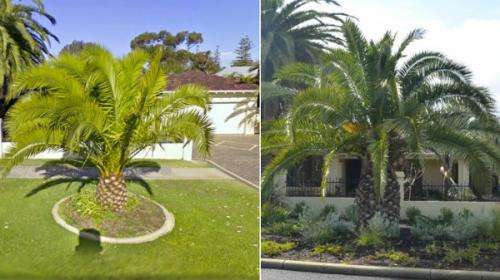Replacing water-hungry lawn with natives provides habitat for local fauna and reduces water usage. Credit: Hannah Uren
Factors like a sense of community and residents who are 'keeping up with the Jonses' are among complex drivers behind Australian's preferences for European, colonial style gardens over designs using native plants.
Despite rising temperatures and rainfall declines, many Perth suburban homes still have colonial style gardens with water-dependent plants and trees, however the suburb of Fremantle has paved the way for more ecologically sensitive gardens.
Curtin University researcher Hannah Uren interviewed 12 Fremantle residents individually who had purchased homes in the area and converted the existing gardens from European style to native vegetation.
"Fremantle has long held an identity as alternative and 'different,'" she says.
The study found fostering a sense of community is likely to help promote greener suburbs, so long as that community values being 'green' or acting sustainability.
"If people feel a sense of belonging and obligation to their community, then they are more likely to act in the interest of the collective needs of that community," Ms Uren says.
The study also investigated the role social norms had on influencing garden design, discovering a flow-on effect, with residents adopting native gardens after being inspired by their neighbours.
"Some research participants hinted that they would have felt uncomfortable adopting a native garden before they had moved to Fremantle, because it wouldn't have fitted in with the social norms and customs of the area," Ms Uren says.
A residential landscape conversion from an exotic verge (left) to Australian Native verge (right). Credit: Hannah Uren
The researchers examined the impact of European gardening fables ingraining gardening as an emotional and social experience, with bright colours associated with positivity and energy, and a well-kept garden a point of pride and standing in the community.
Native Australian plants are often woody and brown rather than lush and green, and tend to have short lifespans or die off in the summer months, which was found to dishearten and embarrass residents, who were afraid outsiders would think they were poor gardeners.
The study found that having a significant amount of environmental knowledge and awareness gave the 12 residents a deeper connection with nature and left them feeling a moral responsibility to protect the Earth, reflecting the impact of education.
Ms Uren says environmental awareness and social norms are factors driving garden design, and that a broader investigation into these factors and their interactions is needed to achieve ecologically sensitive garden designs across Perth.
"The article helps to highlight the importance of taking a holistic perspective when considering how to achieve more ecologically sensitive residential gardens," she says.
Provided by Science Network WA























